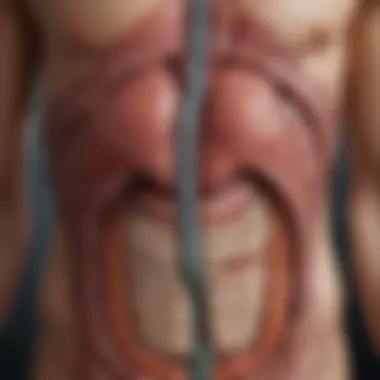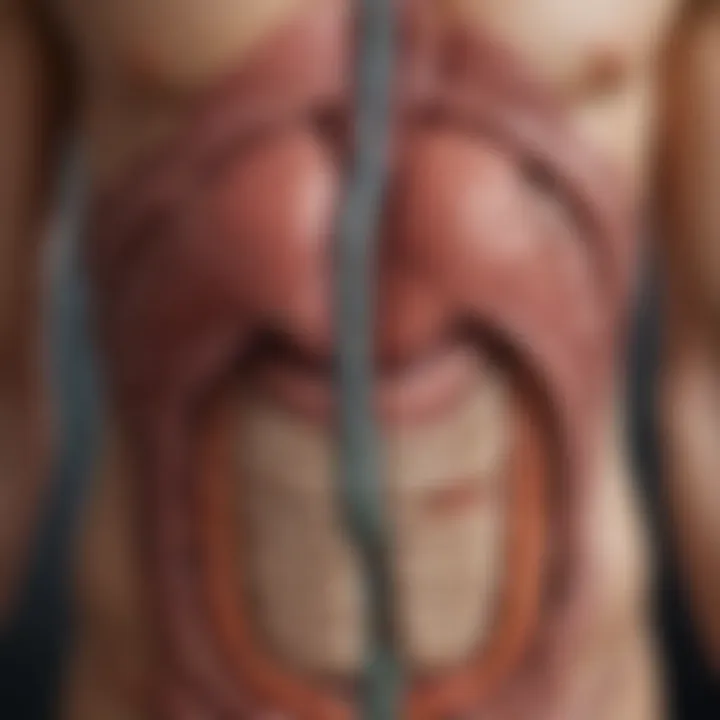Stress and Gallbladder Pain: Unraveling the Link


Intro
The interrelationship between stress and gallbladder pain is complex yet pivotal in understanding various health issues many face today. Chronic stress, often considered a modern affliction, has profound effects on the digestive system. This link not only raises questions about physiological responses but also about how emotions and mental states can manifest as physical discomfort, specifically in the gallbladder region.
The gallbladder, a small organ, plays a critical role in digestion by storing bile produced by the liver. When the body experiences stress, a cascade of hormonal changes occurs, affecting not just general well-being but also digestive functions. Stress can lead to alterations in bile production and flow, potentially resulting in gallbladder pain.
Understanding this interplay is crucial for both medical professionals and individuals suffering from these conditions. Several stressors vary dramatically across individuals, impacting the digestive system in distinct ways. Addressing both the physiological and psychological components may lead to more effective treatment and management strategies.
Intro to Gallbladder Pain
Understanding gallbladder pain is important due to its connections with digestive health and overall well-being. Gallbladder issues can significantly impact a person's quality of life, often leading to chronic discomfort and complicating treatment plans. This section will outline the nuances of gallbladder pain, which is essential for anyone aiming to comprehend how various factors, including stress, can exacerbate these conditions.
Defining Gallbladder Pain
Gallbladder pain typically manifests as a sharp or dull ache in the right upper abdomen. Patients may experience discomfort that radiates to the back or right shoulder. This pain often correlates with meals, especially those high in fat, indicating potential dysfunction in gallbladder function. To address gallbladder pain effectively, it is crucial first to establish a clear definition and recognize its symptoms thoroughly.
Typically, the pain is associated with gallbladder disorders such as cholecystitis, gallstones, or biliary dyskinesia. Understanding these definitions is foundational for both medical practitioners and patients in navigating potential treatment avenues.
Common Causes of Gallbladder Pain
Several underlying conditions can result in gallbladder pain. Common causes include:
- Gallstones: Hard deposits that form in the gallbladder, often blocking bile ducts and causing pain.
- Cholecystitis: Inflammation of the gallbladder, which can result from a blockage by gallstones.
- Biliary Dyskinesia: A condition where the gallbladder does not function effectively, leading to pain and digestive complications.
- Bile Duct Obstruction: Conditions hindering bile flow can also lead to gallbladder distress.
- Pancreatitis: Inflammation of the pancreas, sometimes linked to gallbladder issues, can radiate pain similar to gallbladder pain.
Identifying these causes is vital for developing effective treatment strategies and managing symptoms appropriately. It also sets the stage for understanding the interplay between stress and gallbladder pain, which will be explored in subsequent sections.
Understanding Stress and Its Effects
Understanding stress and its effects is critical to this article. Stress not only impacts mental health but also plays a significant role in physical well-being. It can affect various bodily functions, including the digestive system, where the gallbladder is particularly sensitive.
The myriad of stressors individuals face daily can lead to physiological changes that exacerbate gallbladder pain. Recognizing this relationship allows individuals and healthcare professionals to develop more effective management strategies. By exploring the significance of stress, we can better appreciate how mental and emotional states influence physical health.
What is Stress?
Stress can be defined as a body's reaction to demand or pressure. It can manifest physically, emotionally, and cognitively. Stress can trigger a cascade of responses in the body, releasing hormones such as cortisol and adrenaline. These hormones prepare the body for a "fight or flight" response.
The experience of stress differs from person to person. Some may find certain situations overwhelming, while others may adapt easily. Factors affecting this variability include personality, resilience, and previous experiences. Understanding these individual differences is crucial in addressing health issues, including gallbladder pain.
Types of Stress: Acute vs. Chronic
Stress can generally be categorized into two main types: acute and chronic.
- Acute Stress: This type of stress is often short-term. It arises in response to specific events, such as an upcoming presentation or an unexpected challenge. Acute stress can have immediate effects, including increased heart rate and heightened awareness. While uncomfortable, it usually subsides once the stimulus is removed. Frequent episodes of acute stress can lead to more significant health issues if not managed properly.
- Chronic Stress: Unlike acute stress, chronic stress persists over an extended period. It may stem from ongoing life situations like workplace demands, relationship issues, or financial problems. Chronic stress can have detrimental effects on health. It affects not just mental well-being but can lead to physical ailments such as gallbladder disorders. The prolonged hormonal imbalance can impact the digestive system, making it essential to recognize and address chronic stress.
In summary, understanding the nuances of stress is vital for addressing its impact on gallbladder health and overall well-being. The relationship between stress and gallbladder pain is complex, demanding a thorough examination of both psychological and physical aspects to enhance treatment approaches.
"Stress affects our body like a switch - turning on various systems but can lead to long-term flaws if not turned off in time."
Being aware of the types of stress allows for better management strategies tailored to individual needs.
The Biopsychosocial Model of Stress
The relationship between stress and gallbladder pain can be understood through the Biopsychosocial Model of Stress. This model recognizes that health is influenced by a combination of biological, psychological, and social factors. Understanding this interplay is crucial as it helps in identifying the complex mechanisms that connect stress to gallbladder function.
By exploring the biological responses to stress, we can see how hormones and neurotransmitters might affect gallbladder motility. Psychological factors help us appreciate how individual perceptions of stress contribute to pain experiences. Social influences, including family support and social networks, further contextualize how stress manifests physically. All these elements play significant roles in developing a more comprehensive approach to treatment and management of gallbladder pain.
Biological Factors
Biological factors encompass various physiological responses that occur during stressful situations. When an individual experiences stress, the neuroendocrine system is activated. This leads to the release of stress hormones such as adrenaline and cortisol.
These hormones can impact gallbladder function by:
- Altering bile secretion.
- Affecting the motility of the gallbladder.
- Influencing digestive enzyme production.
The dysfunction in bile flow may contribute to problems such as biliary dyskinesia, which can result in pain. Understanding these biological responses provides a pathway for creating targeted therapeutic interventions aimed at regulating hormone levels and improving gallbladder health.
Psychological Factors
Psychological factors consider how stress perception shapes a person's experiences and responses to pain. Individuals may react differently to similar stressors based on their mental resilience, coping mechanisms, and past experiences. Stress can manifest in anxiety, depression, and other emotional disturbances, which can exacerbate feelings of pain.


Notably, cognitive appraisal plays a significant role. How a person interprets their stress can change the way they experience physical symptoms.
- Negative patterns of thinking may amplify pain sensations.
- Adaptive coping strategies can mitigate stress impacts and enhance pain management.
Therefore, addressing psychological aspects is vital for holistic management of gallbladder pain.
Social Factors
Social factors involve the surrounding environment and relationships that influence stress levels. Support systems, such as family and friends, are critical in how one copes with stress. A lack of social support can lead to heightened feelings of isolation, which can exacerbate physical symptoms, including gallbladder pain.
Other social determinants include:
- Economic stability, which affects access to healthcare and stress management resources.
- Cultural beliefs that influence perceptions of stress and health.
Recognizing these social elements is essential for healthcare providers seeking to implement effective treatment plans. Incorporating social support can enhance treatment adherence and improve outcomes for those experiencing stress-related gallbladder issues.
"The Biopsychosocial Model illustrates the need for multifaceted treatment approaches that address the entirety of the individual's experience with stress and pain."
This comprehensive framework facilitates personalized care strategies that encompass biological, psychological, and social aspects, leading to improved management of gallbladder pain.
Physiological Mechanisms Linking Stress to Gallbladder Function
Understanding the physiological mechanisms that link stress to gallbladder function is crucial for recognizing how mental and emotional health can impact physical health. These mechanisms demonstrate the intricate networks between stress responses and digestive health. Stress can trigger a cascade of biological reactions, influencing gallbladder performance and overall digestion. By comprehending these connections, healthcare professionals can offer more targeted interventions for patients experiencing gallbladder pain related to stress.
Neuroendocrine Response to Stress
The neuroendocrine response to stress involves hormonal changes initiated by the hypothalamus, which leads to the release of corticotropin-releasing hormone (CRH). This is a pivotal first step in the stress response. Once released, CRH stimulates the pituitary gland to secrete adrenocorticotropic hormone (ACTH). In turn, ACTH prompts the adrenal glands to release cortisol, a stress hormone. Cortisol plays a significant role in the body’s response to stress but can also have negative impacts on gallbladder function.
Cortisol has been shown to affect bile production and flow. High cortisol levels can lead to a decrease in bile production, which may slow gallbladder emptying. This reduction in bile can contribute to digestive issues, resulting in discomfort or pain. For individuals with preexisting gallbladder disorders, this stress-induced hormonal shift might aggravate symptoms.
The influence of stress hormones can extend to inflammation as well. Chronic stress may lead to inflammation of the gallbladder or bile ducts, fueling conditions like cholecystitis. Thus, understanding the neuroendocrine response can help in devising treatments that focus on reducing stress and, consequently, its impact on gallbladder function.
Gastrointestinal Tract Response
The gastrointestinal tract serves as a primary area affected by stress. When stress manifests, the body activates the sympathetic nervous system, often referred to as the fight or flight response. This response can lead to significant changes in digestive processes. For instance, it may temporarily inhibit peristalsis, the wave-like muscle contractions that move food through the digestive system.
Moreover, stress can alter gut motility and increase the sensitivity of the gastrointestinal tract. Those experiencing stress might notice changes such as abdominal pain, bloating, or changes in bowel habits, which can confuse the signals sent by gallbladder dysfunction. This confusion in the digestive pathways highlights the importance of understanding how stress can disrupt normal gastrointestinal function, leading to pain or discomfort specifically related to the gallbladder.
Stress-induced changes in the gastrointestinal environment can create an imbalance in gut flora. This disruption can potentially exacerbate gallbladder issues, as a healthy gut microbiome contributes to proper digestive function. Maintaining gut health through lifestyle modifications may serve as a preventive measure in managing gallbladder pain linked to stress.
Overall, the understanding of these physiological mechanisms is essential for formulating effective management strategies for individuals suffering from stress-related gallbladder pain. Comprehensive interventions may include stress management techniques and dietary adjustments to support gallbladder health.
Impact of Stress on Gallbladder Disorders
Understanding the impact of stress on gallbladder disorders is crucial for both patients and healthcare professionals. Stress can significantly disrupt normal digestive function, leading to various gallbladder-related issues. By exploring this connection, we gain insights into diagnosis and treatment options that can enhance patient care.
One of the main benefits of recognizing this relationship is that it opens up avenues for developing targeted management strategies. Patients suffering from gallbladder pain often report heightened stress levels, which might exacerbate their condition. This interplay highlights the need for comprehensive treatment approaches that consider both physical and psychological aspects.
Stress can provoke specific changes in body physiology. For instance, it activates the sympathetic nervous system, causing alterations in bile flow that may lead to gallbladder dysfunction.
Key Elements to Consider:
- Assessment of Stress: Regular evaluation of stress levels can be beneficial for individuals suffering from gallbladder issues.
- Informed Treatment Plans: Stress management techniques can be integrated into overall treatment protocols for gallbladder disorders.
- Holistic Approach: Recognizing stress as a factor allows for a holistic view of a patient’s health, leading to more effective interventions.
In summary, the impact of stress on gallbladder disorders is a vital area that requires attention. By understanding its implications, patients can receive more informed care, particularly in managing their overall well-being.
Stress-Induced Biliary Dyskinesia
Stress-induced biliary dyskinesia refers to a condition in which the gallbladder does not function properly due to stress-related factors. This dysfunction can lead to biliary colic, causing pain in the upper right abdomen. The connection lies in how stress affects the neuromuscular control of the gallbladder, leading to erratic bile release.
Studies show that individuals with chronic stress may experience muscle tension and spasms in the gallbladder area. It is critical to identify these symptoms.
Symptoms of Biliary Dyskinesia:
- Episodes of intense pain in the upper right abdomen
- Nausea or vomiting after eating
- Indigestion and bloating
Effective management strategies for stress-induced biliary dyskinesia may include stress reduction techniques such as mindfulness, meditation, and physical activity. These approaches can help improve not only mental well-being but also enhance gallbladder function.
Stress and Gallstones


The formation of gallstones is another concern linked to stress. Stress can trigger hormonal changes that may lead to biliary cholesterol supersaturation, a key factor in gallstone formation. Elevated cortisol levels, commonly seen during stressful times, can alter bile composition and gallbladder motility.
Factors Contributing to Gallstone Formation Under Stress:
- Hormonal Changes: Increased cortisol can lead to imbalances in bile acids.
- Dietary Choices: Stress often leads to poor dietary habits which contribute to gallstone development.
Preventing stress-related gallstone issues involves maintaining a healthy lifestyle. Strategies such as balanced diets, regular exercise, and adequate sleep are essential. Recognizing the role of stress not only assists in treating existing conditions but also in preventing new ones from developing.
"Managing stress effectively can help mitigate risks related to gallbladder disorders and improve overall quality of life."
As we continue to explore the relationship between stress and gallbladder health, further research will contribute to better clinical practices and patient education.
Symptoms of Stress-Related Gallbladder Pain
Understanding the symptoms of stress-related gallbladder pain is essential for both identification and management of this condition. Stress can often exacerbate existing gallbladder issues or create new disturbances, leading to painful symptoms. Recognizing these symptoms can help patients seek appropriate treatment sooner, potentially reducing complications associated with gallbladder disorders.
Combined knowledge of stress and gallbladder pain symptoms allows for a more comprehensive approach to patient care. By integrating stress management techniques with gallbladder health strategies, individuals can improve their overall quality of life. This section aims to delineate the signs associated with gallbladder pain brought about by stress and provide guiding principles for recognition.
Identifying Gallbladder Pain Symptoms
Gallbladder pain often manifests in specific ways. Key symptoms include:
- Upper abdominal pain: Typically in the right upper quadrant, can be sharp or dull.
- Nausea and vomiting: Often accompany abdominal pain, creating discomfort.
- Bloating: A feeling of fullness can indicate gallbladder issues, especially when stressed.
- Indigestion: Stress may lead to digestive disturbances, making gallbladder pain more noticeable.
- Radiating pain: Pain might extend to the back or right shoulder area.
An important aspect to consider is that these symptoms can become more pronounced during or after stressful situations. Stress induces physiological changes that may heighten pain sensitivity and gastrointestinal reactions.
Differentiating from Other Abdominal Pain
It is crucial to differentiate stress-related gallbladder pain from other forms of abdominal discomfort. Various conditions can present similarly, including:
- Peptic ulcers: Characterized by burning abdominal pain and sometimes relieved by eating.
- Gastritis: Inflammation can cause similar upper abdominal issues, but often includes a general sense of nausea.
- Pancreatitis: Pain tends to be severe and can radiate to the back, distinct from gallbladder discomfort.
To accurately identify gallbladder pain, consider the following:
- Timing: Does pain occur after fatty meals or periods of high stress?
- Pain quality: Is the pain sharp and localized, or more generalized and dull?
- Associated symptoms: Are there nausea and bloating, indicating possible gallbladder involvement?
Ultimately, a thorough understanding of these symptoms and their implications can facilitate better discussions between patients and healthcare professionals, enhancing diagnosis and treatment options.
Diagnosis of Gallbladder Pain
Gallbladder pain can arise from various conditions. Diagnosing this pain accurately is crucial for effective treatment. A correct diagnosis helps in determining whether gallbladder issues stem from stress or other underlying problems. Furthermore, accurate diagnosis can prevent unnecessary procedures and lead to more targeted therapies.
The complexity of gallbladder-related pain often requires a multi-step approach. Patients may present with a variety of symptoms, which can overlap with those of other abdominal conditions. Therefore, a detailed examination is pivotal. Additionally, understanding the patient’s stress levels is essential, as stress can exacerbate gallbladder symptoms.
Clinical Evaluation
A clinical evaluation primarily involves gathering a comprehensive history of the patient’s symptoms. This may include the onset, duration, and nature of the pain. The healthcare provider often asks about dietary habits, lifestyle factors, and psychological stressors that could contribute to the pain.
Physical exams may reveal tenderness or pain upon palpation in the right upper quadrant of the abdomen. This area houses the gallbladder and nearby organs, and any signs of distress here can provide valuable information. Blood tests are also common, as they can indicate the presence of inflammation, infection, or other liver anomalies that may relate to gallbladder condition.
"Accurate clinical evaluation is the first step in understanding gallbladder pain, linking both physiological and psychological factors."
In addition, family history of gallbladder disease can also play a significant role. If gallbladder disorders are common within a family, this may increase suspicion for similar conditions in the patient. Hence, thorough clinical evaluation must consider both personal and familial health factors.
Imaging Techniques
Imaging techniques serve as vital tools in diagnosing gallbladder pain. Common methods include ultrasound, CT scans, and MRI. Each imaging modality offers unique advantages.
- Ultrasound is often the first-line imaging technique. It is non-invasive and can quickly detect gallstones or inflammation.
- CT scans provide more detailed images and can be particularly useful for identifying complications.
- MRI is less common for gallbladder assessment but may be used in specific cases to evaluate biliary tree anatomy.
Healthcare professionals often choose imaging methods based on clinical findings from the evaluation phase. An appropriate imaging study can lead to a timely and accurate diagnosis, thus facilitating effective management of gallbladder pain.
Management and Treatment Strategies
Understanding how to manage and treat gallbladder pain related to stress is crucial. This aspect ties into the broader narrative of the relationship between stress and gallbladder function. Effectively addressing this connection can lead to improved quality of life for individuals experiencing these symptoms. Recognizing the multifaceted nature of stress impacts allows healthcare professionals and patients alike to adopt a comprehensive approach to treatment.
Lifestyle Modifications
Lifestyle modifications serve as a fundamental strategy in managing gallbladder pain. These changes can help mitigate stress and enhance overall digestive health.


- Dietary Changes: A balanced diet low in saturated fats and high in fiber can support gallbladder function. Foods like fruits, vegetables, and whole grains help in reducing the risk of gallstones and alleviate symptoms associated with stress-induced gallbladder pain.
- Regular Exercise: Engaging in regular physical activity is beneficial. Exercise reduces stress levels and promotes digestive health by improving gut motility. Even moderate workouts like walking can produce significant benefits.
- Sleep Hygiene: Ensuring adequate sleep is vital. Sleep deprivation can exacerbate stress and lead to an increase in gallbladder issues. Creating a consistent sleep schedule can improve recovery and health.
By implementing these lifestyle modifications, individuals can actively manage the symptoms of gallbladder pain and stress.
Cognitive Behavioral Therapy
Cognitive Behavioral Therapy (CBT) is a well-researched method to address stress and its effects on health. It focuses on recognizing and changing negative thought patterns that contribute to stress and anxiety.
- Coping Mechanisms: Through CBT, individuals learn to develop coping strategies. This may involve techniques to manage stress responses, which can, in turn, lead to reduced gallbladder discomfort.
- Behavioral Changes: CBT can lead to behavior changes through structured sessions. Patients can gain insights into how stress interactions with their gallbladder pain. The realization of these connections is crucial for effective management.
- Long-Term Benefits: Regular sessions can achieve long-term stress reduction. This is not just beneficial for the gallbladder but overall emotional well-being as well.
Investing in CBT offers individuals a personalized pathway to manage their pain more effectively.
Role of Medications
Medications play a supportive role in achieving pain relief and managing stress. While lifestyle modifications and therapy are essential, medication can offer immediate relief in specific scenarios.
- Pain Relievers: Over-the-counter pain relievers, such as ibuprofen or acetaminophen, can help ease acute gallbladder pain. If pain persists, prescription medications may be necessary.
- Anti-Anxiety Medications: In cases where stress is a significant factor, doctors may prescribe anti-anxiety medications. These can address anxiety symptoms that contribute to gallbladder pain.
- Antidepressants: Some antidepressants are effective in treating anxiety and chronic pain. They can play a dual role in managing both mental and physical pain, offering a comprehensive approach.
Medications should not replace other management strategies but work in conjunction for better outcomes.
Preventive Measures
Preventive measures play a crucial role in managing gallbladder pain, particularly when stress is a contributing factor. Understanding these strategies not only aids in preventing acute episodes but also supports long-term gallbladder health. For individuals prone to stress-related gallbladder issues, implementing effective preventive measures can significantly improve their quality of life.
One of the key aspects of prevention is identifying and managing stressors. High levels of stress can trigger changes in bile flow and gallbladder motility. Recognizing the sources of stress, whether they are work-related, personal, or environmental, is the first step. Effective stress management techniques can help mitigate these effects. This can include practices such as mindfulness meditation, regular exercise, and engaging in hobbies that promote relaxation. Here are some notable techniques that might help:
- Mindfulness Meditation: Engaging in mindfulness practices can reduce anxiety and promote a balanced emotional state.
- Deep Breathing Exercises: These can quickly lower stress levels and improve overall mental clarity.
- Physical Activity: Regular exercise is proven to reduce stress hormones and release endorphins, which act as natural painkillers.
Additionally, it is important for individuals to work on dietary considerations that support gallbladder health. A diet rich in fiber, low in saturated fats, and moderate in protein can alleviate stress on the digestive system. Here's a brief overview of dietary considerations:
- Fiber-Rich Foods: Foods like fruits, vegetables, and whole grains can help maintain bowel health and regulate digestion.
- Healthy Fats: Incorporating sources like avocados and nuts is preferable to saturated fats found in fried foods and processed snacks.
- Hydration: Adequate water intake aids digestion, ensuring bile remains fluid and effective.
Ultimately, preventive measures are about building resilience against stress and fostering a conducive environment for gallbladder health. By making intentional changes in daily life, one can significantly reduce the risk of gallbladder pain exacerbated by stress.
"Prevention is better than cure." This adage holds particularly true in the context of gallbladder health and its intricate relation with stress.
In summary, understanding how to manage stress and prioritizing dietary habits can lead individuals towards a healthier, pain-free life. Engaging in these preventive measures requires commitment but can ultimately lead to profound benefits for gallbladder health and emotional wellbeing.
The Role of Healthcare Professionals
In managing the complex relationship between stress and gallbladder pain, healthcare professionals play a crucial role. Their responsibilities go beyond just diagnosing and treating symptoms; they must also understand the interconnectedness of mental and physical health. By recognizing that anxiety and stress can exacerbate gallbladder issues, they provide comprehensive care. This holistic approach ensures patients receive not only medical treatment but also guidance on managing stress effectively.
Collaboration between Specialists
The collaboration between various specialists is vital in addressing gallbladder pain related to stress. This often includes gastroenterologists, psychologists, and dietitians, among others. Each specialist contributes unique knowledge to create a tailored treatment plan that considers both physiological and psychological components. For instance, a gastroenterologist can address the physical symptoms while a psychologist offers cognitive behavioral therapy to manage stress. Working together facilitates a comprehensive understanding of the patient's health.
"A multidisciplinary approach enables better outcomes for patients experiencing gallbladder pain coupled with stress."
Moreover, regular discussions among the healthcare team promote shared insights, ensuring that care strategies are aligned. Patients benefit as they receive a seamless flow of information and coordinated care, which improves adherence to treatment plans and enhances overall satisfaction.
Patient Education and Awareness
Patient education is another critical element in managing stress-related gallbladder conditions. Healthcare professionals should focus on teaching patients about the signs and symptoms associated with gallbladder pain and how stress might influence these issues. Informing patients about stress management techniques, such as mindfulness practices or relaxation exercises, empowers them to take an active role in their health.
Knowledge of dietary adjustments and lifestyle changes can significantly aid in alleviating both stress and gallbladder symptoms. When patients are aware of how their choices impact their health, they can make informed decisions that promote recovery.
Promoting awareness also involves dispelling myths about gallbladder pain and stress. Many patients may not connect their emotional state with physical symptoms. By bridging this gap, healthcare professionals encourage better health-seeking behaviors and foster a more proactive approach towards their health.
Finale
Understanding the complex relationship between stress and gallbladder pain is vital for both patients and healthcare professionals. Stress is not just a mental phenomena; it has profound physiological implications that can manifest as physical symptoms, including pain related to gallbladder dysfunction.
Summarizing Key Points
This article thoroughly explored the multifaceted connection between stress and gallbladder pain. It addressed the following key points:
- Definitions and causes of gallbladder pain, enhancing clarity about what individuals may experience.
- Types of stress, specifically distinguishing between acute and chronic stress, and how each influences health.
- The biopsychosocial model emphasizing that both biological and psychosocial factors contribute to stress-related disorders.
- Physiological mechanisms showing how the body reacts to stress, affecting gallbladder functions.
- Specific impacts of stress on gallbladder disorders, including stress-induced biliary dyskinesia and the formation of gallstones.
- Symptoms linked to stress-related gallbladder pain and methods for differentiating these from other abdominal discomfort.
- Diagnostic approaches, with an emphasis on clinical evaluation and imaging techniques.
- Comprehensive management strategies, highlighting the importance of lifestyle changes, cognitive behavioral therapy, and appropriate medications.
- Preventive measures focusing on stress management techniques and dietary considerations tailored for gallbladder health.
- The key role of healthcare professionals in managing patient care through collaboration and education.
This synthesis is crucial for developing effective management strategies that can alleviate symptoms and enhance quality of life for those affected by stress-related gallbladder issues.
Future Directions for Research
Future research should focus on several areas to deepen our understanding of the interplay between stress and gallbladder pain:
- Longitudinal Studies: Exploring how chronic stress accumulates over time and its long-term effects on gallbladder health.
- Psychological Interventions: Assessing the efficacy of various therapeutic approaches, such as mindfulness and stress reduction techniques, in reducing gallbladder pain.
- Neurobiological Studies: Investigating the neuroendocrine responses to stress and how these responses can be modulated to improve gallbladder function.
- Population Studies: Analyzing how different demographic factors influence the relationship between stress and gallbladder disorders.
By addressing these areas, future studies can significantly contribute to our understanding and management of gallbladder health in relation to stress.







